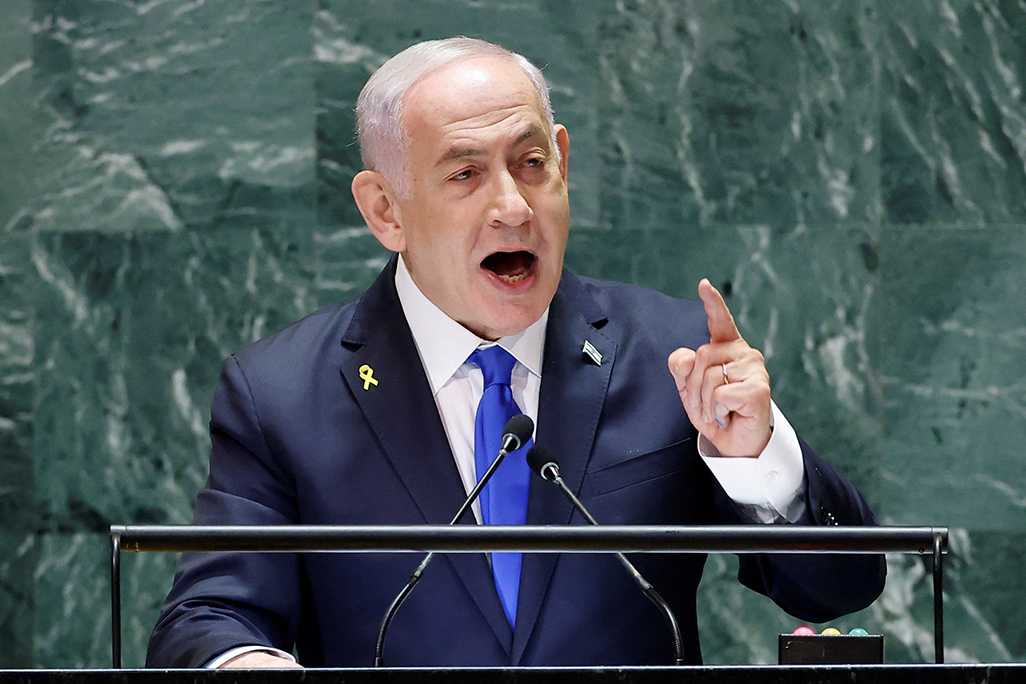
For Israel, the death of Hezbollah leader Hassan Nasrallah has been a moment to savour, uplifting spirits for a country still grappling with the trauma of the October 7 Hamas attack and almost a year of war, and providing a boost to once-embattled Prime Minister Benjamin Netanyahu.
After Nasrallah’s death in an Israeli air strike in Beirut was confirmed on Saturday, Prime Minister Benjamin Netanyahu delivered a televised statement.
“These are momentous days,” Netanyahu said, calling the assassination “a turning point” in the war. “One year later, blow after blow … their hopes have dashed. Israel has momentum; we are winning,” he said.
Netanyahu, widely blamed for the security failures that allowed the October 7 attack to occur, may benefit from it too.
Lifted by the success of the attack on Nasrallah and the assassination a few weeks earlier of the then Hamas leader Ismail Haniyeh, he has strengthened his grip on his sometimes fractious coalition by bringing former ally-turned-rival Gideon Saar into his government, increasing his majority to a comfortable 68 seats in the 120-seat Knesset.
A survey published on Sunday by Israel’s N12 News showed a continuing trend of Netanyahu’s Likud party slowly recovering in the polls, though still losing an election. Asked how they would rate Netanyahu’s conduct of the war, 43 per cent respondents said ‘good’, up from 35 percent in the last poll, ten days earlier.
Israelis were crushed by the October 7 attack and Netanyahu’s security credentials were shattered. The Palestinian Islamist Hamas militant group humiliated the Middle East’s strongest military, when Israeli intelligence failed to warn of an imminent attack and forces slow to repel it.
ISRAEL RESTORES MILITARY CONFIDENCE
The result was the deadliest single day in Israel’s history and the worst security failure since the Yom Kippur war, almost 50 years to the day, with 1,200 dead and more than 250 hostages taken, many of them civilians seized from their homes.
In northern Israel, tens of thousands have been uprooted from their homes since October, when Hezbollah started firing rockets in support of Hamas.
Almost a year on, Israel is still pressing its war against Hamas and Netanyahu has yet to declare victory, with 101 hostages still in Gaza and Hamas, though weakened, still standing.
But the campaign against Hezbollah is different. Nasrallah had led the group to become a regional force and it is viewed by Israel as a far more serious threat, better organised and far better armed than its ally Hamas.
Now it has been hammered, most of its senior leadership has been killed and a significant portion of its arsenal of missiles have been destroyed in two weeks of intense bombardment that have restored Israel’s sense of its own military potency. The unprecedented attack on Hezbollah’s pagers and walkie-talkies, while not confirmed by Israel, has generally been ascribed to its Mossad intelligence service.
Israeli officials say they are confident that the assassination will not create the lasting diplomatic problems brought by the war in Gaza, where Netanyahu’s often repeated aim of “total victory” over Hamas has proved stubbornly difficult to achieve.
Instead, Israel is using as its yardstick United Nations Resolution 1701, which specifies that Hezbollah forces in southern Lebanon should be pushed back over the Litani River, some 30 km (18 miles) from the border.
RELIEF
“Israel now has greater diplomatic leverage, enabling it to advocate for its interests in any agreement, rather than accepting the status quo proposed by the Americans and the French,” said Orna Mizrahi, a researcher at the INSS think tank in Tel Aviv.
She said there would be a short window of opportunity for Israel to press ahead with its campaign against Hezbollah before the civilian casualties from the campaign drew international pressure to end its operations.
On the streets of Nahariya, in northern Israel, a sense of security was somewhat restored.
“I’m very happy that the Israelis killed Hassan Nasrallah. I feel relief. I hope that now will be better, here in Israel. We had to do it before, and we have the best army in the world,” said Ofra Elbaz, a teacher.
However, Israelis may emerge from their mood of exultation when the first anniversary of the October 7 attacks comes around next week, said Aviv Bushinski, a political commentator and former aide to Netanyahu.
The architect of the attack, Hamas leader Yahya Sinwar remains elusive, the hostages are still in Gaza, and despite the spectacular strikes against Hezbollah, the tens of thousands of residents evacuated from the north during months of cross-border fire, have still not returned home.
“We are so intrigued by the last two weeks, the beepers and the walkie-talkie operation, up until taking down all the senior leadership of Hezbollah. But I think that next week, we’re going to wake up to reality again,” he said. “And people will start asking, “Ok what’s now? When is this thing over?”




